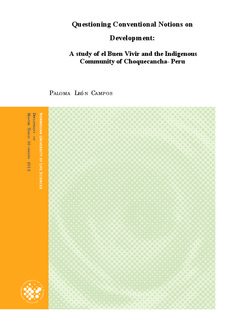| dc.description.abstract | This study examines el Buen Vivir; a proposal that emerged in the Latin- American continent as a result of failed development policies and the appearance of social actors such as indigenoues movements, feminist groups and afro- descendants. This study seeks to understand the proposal of el Buen Vivir and how it challenges conventional notions of development. This project is understood as a political platform where critical views on conventional development are shared and put into practice. This has taken different forms; Bolivia and Ecuador for instance have incorporated the principles of el Buen Vivir in their political constitutions while social movements have made this proposal a political demand. Moreover indigenous people seem to entail some of the elements of el Buen Vivir through their practice and knowledge system.
This research emphasizes the latter aspect by basing the field work on the indigenous community of Choquecancha, situated in the Peruvian highland. Despite being victims of a violent colonization and present marginalization by the Peruvian state and society in general, the indigenous community of Choquecancha has managed to conserve their ancestral practices, values and knowledge systems. The objective of my fieldwork was two folded. On the one hand, to conduct an in-depth study on ancestral food systems and look at how these practices correspond to some of the elements that sustains el Buen Vivir. On the other hand, to analyze to what degree these practices challenges conventional notions on development based on the ideas of economic growth, faith in progress, and, accumulation of goods as synonymous of wellbeing.
In this research I have followed a qualitative case study design. The data collection is mainly based on semi- structured interviews, semi-structured observation with indigenous farmers from Choquecancha and semi- structured interviews with experts on the field of inquiry.
The theoretical framework is based on critical Latin-American knowledge production from which I adopt some of the studies of the modernity/ coloniality research group. These studies look at development as part of a gran modern narrative, at the same time as they conduct a review of previous studies on development and different paradigms in the field. Finally the studies undertake a deconstructive approach that has led to question the nature of development itself.
This study has found that indigenous practices, knowledge systems and relational ontologies that differ from modern dualistic thinking that separates nature from society and culture from economy, are all essential elements that correspond with the main principles of el Buen Vivir. By focusing on ancestral food system, such as Ayni, Minka and Chalayplasa, I have identified not only relationships of self-subsistence but also economic practices that are mediated by reciprocal relationships, solidarity between different communities and communal wellbeing. I have also identified a sense of collective conviviality as the main aspect of being a comunero. These factors enabled me to analyze Ayni, Minka and Chalayplasa beyond economic endeavors and to look at the cultural, political and social dimensions of these practices. The indigenous farmers of Choquecancha displayed an alternative view on production, welfare, nature and growth that not only enrich the proposal of el Buen Vivir but also might even challenge the conventional views on development. In this sense, this field work reinforces the idea that el Buen Vivir do not emerge as an abstract rhetoric but rather as a political project based on the experiences of indigenous people in the continent. | no_NO |
